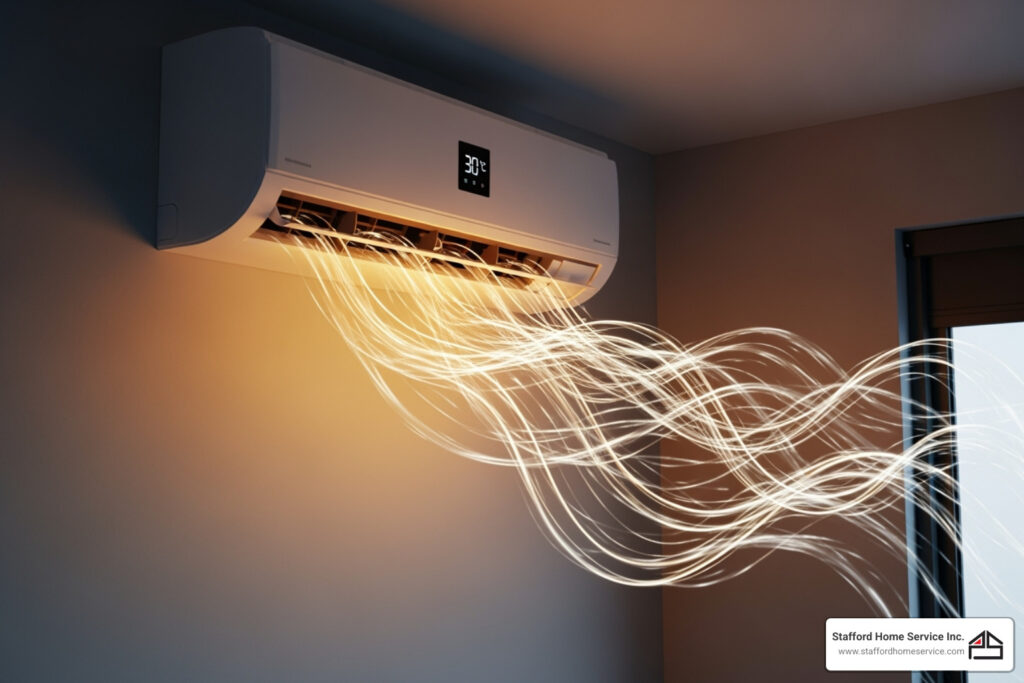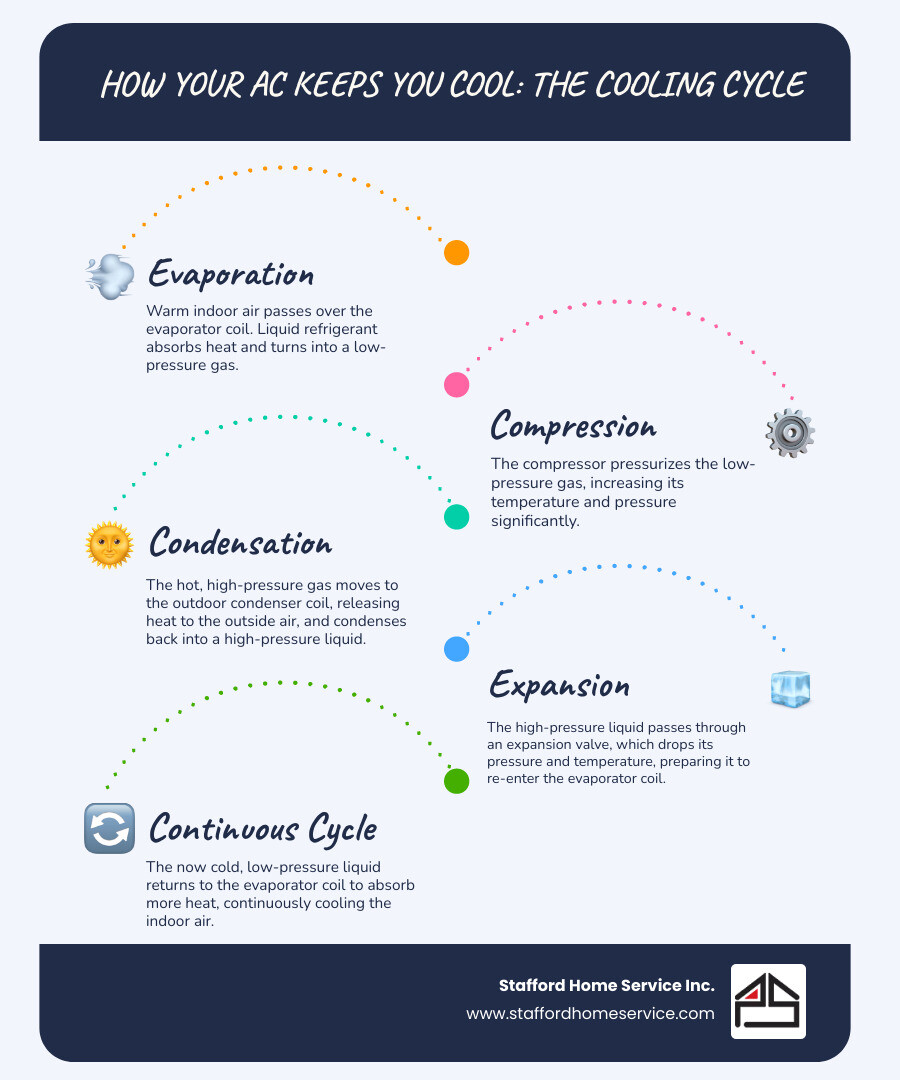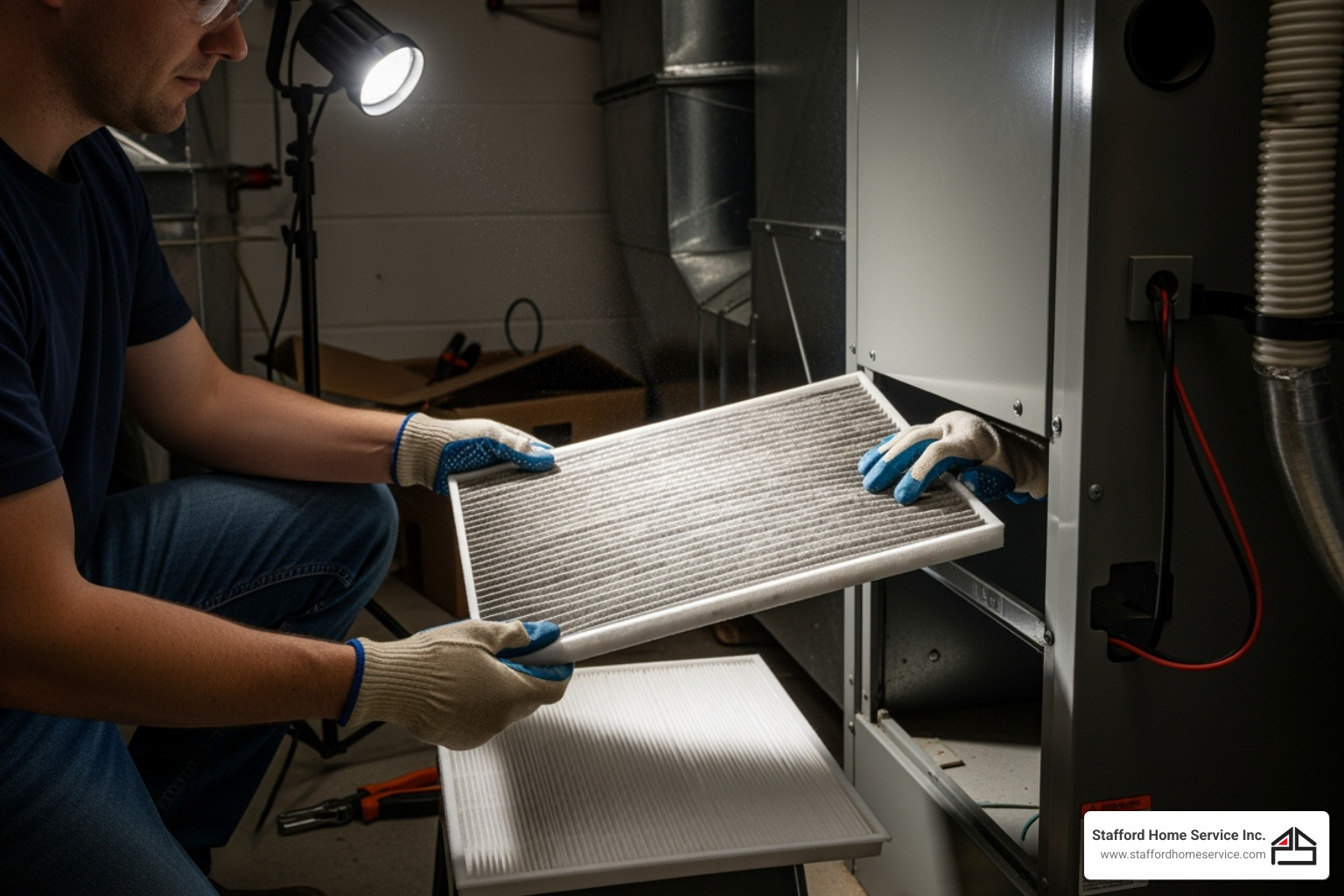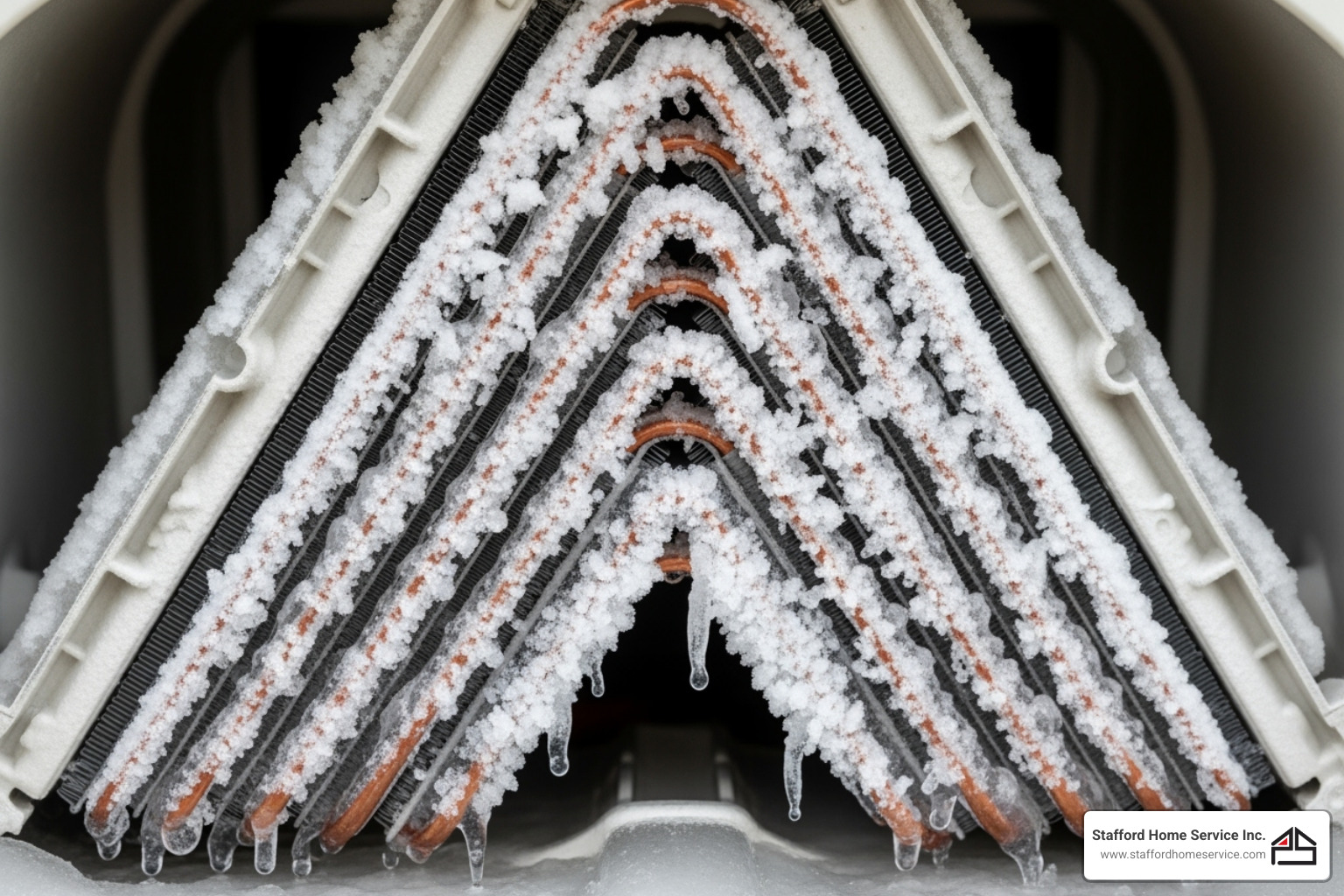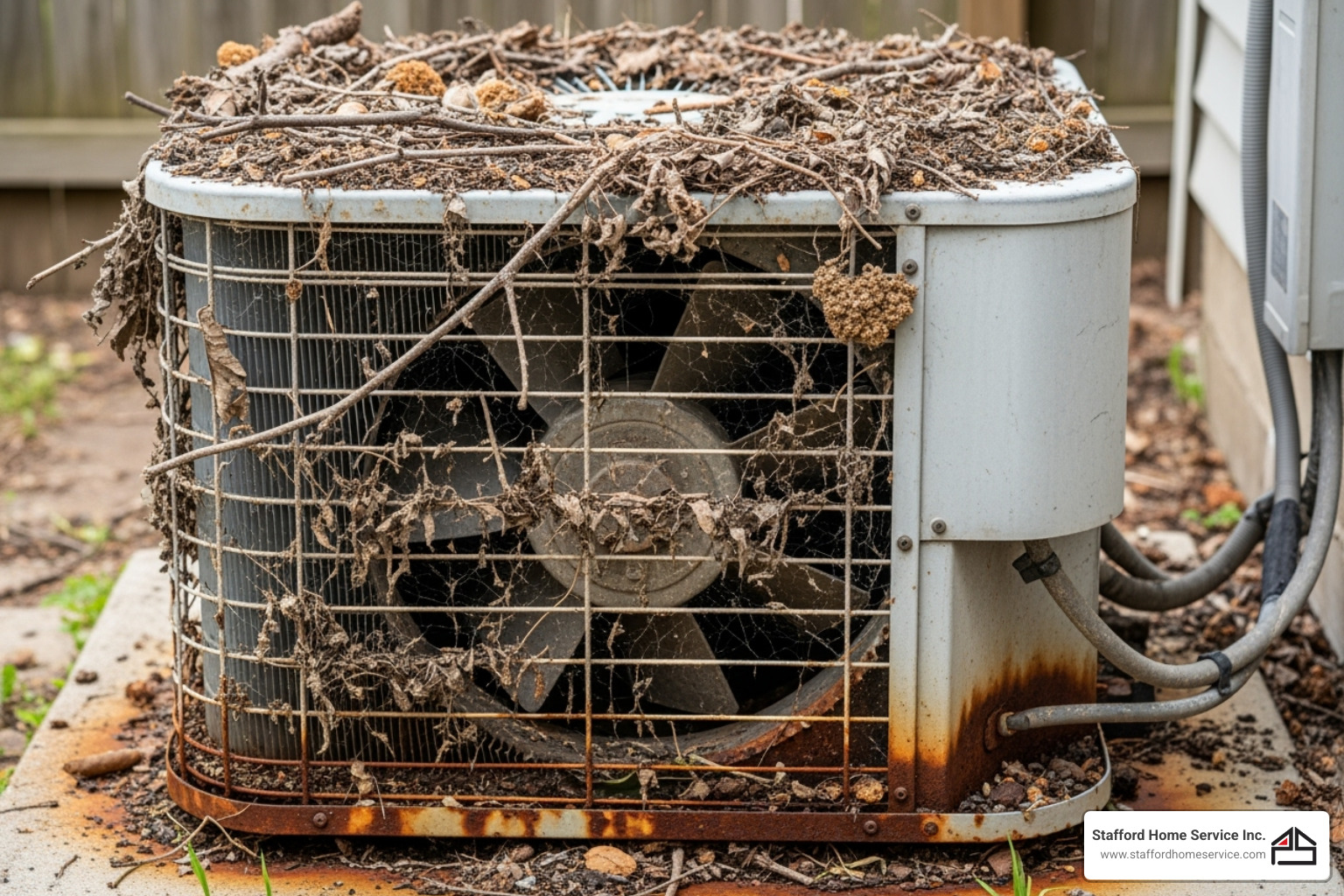When Your AC is Blowing Hot: The Top Causes and Quick Fixes
When your AC blowing hot air hits you on a sweltering summer day, it’s more than just uncomfortable – it can be downright dangerous. Here are the most common reasons and what you can do about them:
Quick Diagnosis Checklist:
- Thermostat Issues – Check if it’s set to “Cool” not “Fan” mode
- Dirty Air Filter – Replace if clogged (most common cause)
- Tripped Circuit Breaker – Reset if needed
- Low Refrigerant – Requires professional repair
- Frozen Evaporator Coils – Turn off AC immediately
- Dirty Outdoor Unit – Clean debris from condenser
- Electrical Problems – Call a professional for safety
Nothing kills summer comfort faster than an air conditioner that’s supposed to cool your home but instead pumps out warm air. According to HVAC experts, dirty air filters are one of the most frequent culprits when your AC stops cooling properly.
The good news? Many AC problems have simple solutions you can try yourself. Others need professional attention to avoid costly damage or safety risks.
This guide walks you through both the 5-minute fixes you can tackle right now and the warning signs that mean it’s time to call in the experts. We’ll help you understand why your system is struggling and get your home back to being the cool refuge it should be.
Start Here: Simple DIY Checks You Can Do in 5 Minutes
Before you start sweating about repair bills, take a deep breath. Many times when your AC blowing hot air, the solution is surprisingly simple. Let’s walk through some quick checks that might save your day (and your wallet).
Start with your thermostat – it’s the brain of your cooling system. We’ve all been there: someone in the house “helpfully” adjusts the settings, or you accidentally bump a button. Make sure it’s set to “Cool” mode, not “Fan” or heaven forbid, “Heat.” Also check that the fan setting is on “Auto” rather than “On.” When it’s stuck on “On,” the fan keeps blowing even when the cooling cycle isn’t running, which can feel like warm air.
While you’re at the thermostat, try fresh batteries if your unit uses them. A dying battery can scramble communication between your thermostat and AC unit, causing all sorts of confusing behavior.
Next up is your air filter – the unsung hero that’s often the villain when your AC stops cooling. Think of it this way: if you had to breathe through a dirty sock, you’d struggle too. That’s exactly what happens to your AC with a clogged filter.
A dirty filter restricts airflow, making your system work overtime while delivering less cooling. It’s one of the most common reasons for AC problems, yet it’s also the easiest and cheapest to fix. Pull out that filter and hold it up to the light. If you can’t see through it clearly, it’s time for a replacement.
Now let’s check your circuit breaker. Air conditioners are power-hungry beasts, and sometimes they trip the breaker. Head to your electrical panel (usually in a basement, garage, or utility closet) and look for a breaker that’s flipped to “off” or sitting in the middle position.
If you find one, flip it firmly to “off” first, then back to “on.” Give your AC about 10 minutes to reset and restart its cooling cycle. If that breaker keeps tripping repeatedly, though, you’ve got a bigger electrical issue that needs professional attention.
Finally, make sure your AC can actually breathe. Check all your vents – both the return vents that suck air in (usually larger, on walls or ceilings) and the supply vents that blow cool air out (typically smaller, near windows or floors).
Blocked vents are like putting a hand over your mouth while trying to run a marathon. Furniture, curtains, or even pet toys can obstruct airflow and make your system struggle. Clear away any obstacles and give your AC the breathing room it needs to keep you comfortable.
These simple checks solve the problem more often than you’d think. If none of them work, don’t worry – we’ll dive into the more complex issues next.
Why Is My AC Blowing Hot? 7 Common Culprits
If those quick checks didn’t solve the mystery of your AC blowing hot air, it’s time to dig a little deeper. These issues often require more than a simple flip of a switch, but understanding them can help you diagnose the problem and know when it’s definitely time to call in the professionals.
Low Refrigerant: The Reason Your AC is Blowing Hot Air
Think of refrigerant as the lifeblood of your AC system. It’s a special chemical that flows through your unit, absorbing heat from your indoor air and releasing it outside. This continuous cycle is what makes your home cool. If your refrigerant levels are low, your AC simply can’t perform this heat transfer efficiently, leading to warm air circulating through your vents.
“But wait,” you might ask, “doesn’t refrigerant last forever?” In a perfectly sealed system, yes, it should. However, if your refrigerant is low, it almost always means you have a leak. Refrigerant doesn’t get “used up” like fuel; it circulates in a closed loop. Signs of a refrigerant leak can include hissing sounds coming from your unit (the sound of gas escaping), or even oily residue around refrigerant lines. Adding more refrigerant without fixing the underlying leak is like patching a leaky tire without finding the nail – it’s a temporary fix that won’t solve the problem and can even lead to more costly damage down the road. If you suspect low refrigerant, it’s time to call us.
Frozen Evaporator Coils: An Icy Sign Your AC is Blowing Hot
It might seem counterintuitive that a problem involving ice could lead to your AC blowing hot air, but it’s a very common issue! The evaporator coil, located in your indoor unit, is where the refrigerant absorbs heat from the air. When this coil freezes over, it can’t absorb heat effectively, and thus, your AC starts blowing warm air because the cooling process is severely hampered.
What causes these coils to turn into an ice block? The most common culprits are poor airflow (often due to a dirty air filter, blocked return vents, or a malfunctioning blower fan) or low refrigerant levels. If air can’t properly flow over the cold coils, the moisture in the air condenses and freezes. Similarly, if there’s not enough refrigerant, the coil gets too cold, causing ice to form.
If you spot ice buildup on your indoor unit’s coils or refrigerant lines, turn off your AC immediately. Let the ice thaw completely (this can take several hours, or you can speed it up by turning on your system’s fan-only mode). Once thawed, check your air filter and ensure all vents are open. If the problem persists, it’s likely a deeper issue requiring professional diagnosis. For a deeper dive, you can learn more about What is an evaporator coil?.
Dirty Outdoor Condenser Unit
Your outdoor AC unit, also known as the condenser unit, plays a crucial role: it releases the heat that your indoor unit absorbed from your home. It contains condenser coils that dissipate this heat into the outside air. If these coils are caked with dirt, leaves, grass clippings, or other debris, they can’t effectively release heat. This causes the system to overheat and struggle, leading to your AC blowing hot air.
Regularly inspect your outdoor unit. Keep the area around it clear of plants and debris (at least two feet of breathing room is ideal). If you see a buildup of dirt, you can carefully clean the outside fins with a garden hose. Before attempting any cleaning, always ensure the power to your outdoor unit is completely shut off at the circuit breaker to prevent electric shock. For more detailed instructions, check out How to clean your condenser.
Clogged Condensate Drain Line
As your AC system cools your home, it also removes humidity from the air. This moisture condenses into water, which then drains away through a condensate drain line. Over time, algae, mold, and sludge can build up in this line, causing a blockage. When the line clogs, the water backs up, potentially causing water leaks and, more importantly for our topic, triggering a safety switch. This switch is designed to prevent water damage to your home, but it also shuts down your AC’s cooling cycle, resulting in your AC blowing hot air. If you notice standing water near your indoor unit or a sudden system shutdown, a clogged drain line could be the culprit.
Leaky Ductwork
Your air ducts are like the circulatory system of your HVAC. They transport cooled air from your AC unit throughout your home. But if your ductwork has leaks, cracks, or disconnections, that precious cool air can escape into unconditioned spaces like your attic or crawl space before it ever reaches your living areas. Worse still, warm, unconditioned air from those spaces can be drawn into your ducts, mixing with the cool air and making your AC blowing hot or at least lukewarm air. Duct leaks not only reduce cooling efficiency but also lead to higher energy bills because your system has to work harder to maintain the desired temperature. We can inspect and seal leaky ductwork to ensure your cooled air makes it where it needs to go.
Malfunctioning Compressor
The compressor is often called the “heart” of your air conditioning system. It’s responsible for circulating the refrigerant and increasing its pressure and temperature, a critical step in the cooling process. If your compressor malfunctions or fails, your AC unit simply cannot cool the air. Signs of a failing compressor can include grinding or clicking noises coming from your outdoor unit, or the unit failing to start its cooling cycle entirely. A malfunctioning compressor is a serious issue that almost always requires professional diagnosis and repair or replacement.
Electrical Failures
Your AC system relies on a complex network of electrical components to operate correctly. Issues like a faulty capacitor (which provides the initial jolt of electricity to start the compressor and fan motors), a malfunctioning contactor (a switch that turns the outdoor unit on and off), or worn wiring can all prevent your AC from cooling. You might notice your outdoor unit not turning on, unusual humming noises, or even a burnt smell if there’s an electrical problem. Electrical issues are not only frustrating but can also be serious safety hazards. We strongly advise against attempting to diagnose or repair these problems yourself.
When to Call a Professional: Signs Your AC Needs an Expert
Look, we love a good DIY success story as much as anyone. There’s something deeply satisfying about fixing a problem with your own two hands. But when it comes to your AC blowing hot air, some issues are like trying to perform surgery with a butter knife – you might think you’re helping, but you could end up making things much worse (and more expensive).
Here’s the thing: HVAC systems are complex beasts with electrical components, pressurized refrigerant, and moving parts that can be dangerous if handled incorrectly. We’ve seen too many well-intentioned homeowners turn a simple repair into a major headache. That’s why we want to share the clear warning signs that mean it’s time to step back and let the professionals take over.
Strange sounds are your AC’s way of crying for help. If you hear hissing or bubbling noises coming from your unit, that’s almost certainly a refrigerant leak talking. Remember how we mentioned that refrigerant doesn’t just disappear? Those sounds are literally the refrigerant escaping from your system. Trying to fix this yourself isn’t just ineffective – it can be dangerous since refrigerant requires special handling and equipment.
Ice that keeps coming back is another red flag. You followed our advice, turned off the system, let everything thaw, changed the filter, and cleared the vents. But if that ice reappears like a bad movie sequel, you’re dealing with a deeper problem that needs professional diagnosis. It could be low refrigerant, a failing blower motor, or other complex issues that require specialized tools to identify and fix.
Electrical problems don’t mess around. If your circuit breaker trips repeatedly – not just once, but keeps happening even after you reset it – your AC is trying to tell you something important. Either there’s a serious electrical fault, or a major component like the compressor is drawing way more power than it should. Both scenarios can be dangerous and expensive if ignored.
Any burning smell should make you hit the brakes immediately. Turn off your AC and call us right away. This could indicate anything from a burnt-out motor to dangerous electrical arcing. We’ve seen these situations escalate quickly, and it’s simply not worth the risk to your home or family.
Sometimes the problem is that your AC won’t turn on at all. You’ve checked the thermostat settings, confirmed the circuit breaker is on, but your system is as lifeless as a smartphone with a dead battery. This usually points to significant electrical or mechanical failure that requires professional diagnostic equipment to identify.
Here’s something we take seriously: the health risks of living without AC during hot weather. The CDC tracks hundreds of heat-related deaths each year, and many happen indoors when people don’t have proper cooling. If you have elderly family members, young children, or anyone with health conditions in your home, a broken AC isn’t just an inconvenience – it can be genuinely dangerous. Don’t wait it out if vulnerable people are involved. You can read more about heat-related illnesses and prevention strategies.
The bottom line? When you’re facing any of these situations, calling Stafford Home Service Inc. isn’t admitting defeat – it’s making the smart choice. We have the specialized tools, training, and experience to diagnose problems safely and fix them right the first time. Plus, our quality workmanship means you won’t be dealing with the same issue again next month.
Trust us, we’ve seen what happens when DIY goes wrong, and it’s always more expensive to fix than if you’d called us from the start.
Frequently Asked Questions about Warm Air from Your AC
We get a lot of calls from homeowners dealing with AC blowing hot air, and honestly, we totally understand the frustration! There’s nothing worse than expecting that refreshing cool breeze and getting hit with warm air instead. Here are the questions we hear most often, along with our honest answers.
Should I turn my AC off if it’s blowing warm air?
Yes, definitely turn it off! We know it seems counterintuitive when you’re already feeling hot, but running your AC when it’s blowing warm air is like driving a car with a flat tire – you’re just making things worse.
When your system isn’t cooling properly, it’s working overtime trying to do its job. This puts unnecessary strain on the compressor, which happens to be the most expensive part of your entire AC system. Think of it as your AC’s heart – you don’t want to overwork it! Continuing to run a struggling system won’t magically make it start cooling again, but it can turn a simple repair into a major headache.
Plus, turning it off gives you a chance to safely check those simple fixes we talked about earlier, like your air filter or blocked vents. And if you see any ice buildup on your coils or lines, switching off the cooling and turning the fan to “on” helps melt that ice without causing damage. There’s also the practical side – why pay for electricity when your AC isn’t actually making you comfortable?
How much does it cost to fix an AC blowing hot air?
This is probably the question we get asked most, right after “When can you get here?” The honest answer is that it really depends on what’s causing the problem, but most repairs fall somewhere between $150 and $600.
Some fixes are surprisingly affordable. A simple filter replacement might just cost you the price of the filter itself. If we’re dealing with a refrigerant leak, the repair cost depends on where the leak is and how extensive it is. Thermostat issues are usually pretty straightforward fixes, while electrical problems like a faulty capacitor fall somewhere in the middle range.
The more complex the problem, the higher the cost – that’s just the reality. Compressor replacement is on the expensive end because it’s essentially the heart of your system. But here’s what we promise: we’ll always give you a clear diagnosis and transparent pricing before we do any work. No surprises, no hidden fees. We believe you deserve to know exactly what you’re paying for and why.
Can a dirty air filter really cause my AC to stop cooling?
Absolutely, and it’s honestly one of the most common culprits we see! We can’t tell you how many service calls we’ve been on where a simple filter change solved the whole problem. It might seem like such a small thing, but a dirty filter can completely sabotage your AC’s performance.
Here’s what happens: your air filter is basically the bouncer for your AC system, keeping dust, dirt, pet hair, and all sorts of particles from getting into the sensitive parts. But when that filter gets clogged up, it’s like trying to breathe through a pillow – your system just can’t get enough air.
This restricted airflow creates a domino effect. Less air flowing over the evaporator coils means less heat gets absorbed, so you end up with warmer air coming out of your vents. Your system has to work much harder to try and pull air through that clogged filter, which wastes energy and puts stress on the blower motor. Worst of all, insufficient airflow can cause your evaporator coils to freeze up, and as we covered earlier, frozen coils are a major reason your AC blowing hot air.
The good news? This is probably the easiest and most affordable fix you can do yourself. We tell all our customers to check their filter monthly and replace it every one to three months, especially during peak cooling season. It’s such a simple thing, but it makes a world of difference in how your AC performs!
Stay Cool: Preventing Future AC Problems
You know what they say – an ounce of prevention is worth a pound of cure! This is especially true when it comes to keeping your AC blowing hot air from becoming a recurring summer nightmare. The good news is that with some simple preventive care, you can keep your system running smoothly and avoid those sweltering days when your AC decides to take an unscheduled vacation.
Regular maintenance is your best friend when it comes to AC reliability. We recommend scheduling an annual tune-up every spring, before the heat really kicks in. Think of it like a physical for your air conditioning system! During these visits, our experienced technicians give your unit a thorough once-over – cleaning coils, checking refrigerant levels, tightening electrical connections, lubricating moving parts, and catching small issues before they turn into big, expensive headaches. It’s amazing how many major breakdowns we can prevent with this simple annual checkup.
Between professional visits, there are plenty of things you can do to keep your system happy. Changing your air filters regularly is still the champion of DIY maintenance – check monthly and replace every one to three months. Your AC will thank you with consistent, cool airflow all season long.
Keep that outdoor unit breathing freely too! Your condenser needs space to work its magic, so make sure the area around it stays clear of leaves, grass clippings, and debris. We recommend keeping plants and shrubs trimmed back at least two feet from all sides. It’s like giving your AC room to stretch and do its job properly.
If you’ve noticed uneven cooling in your home or higher-than-usual energy bills, sealing your ductwork might be the answer. Leaky ducts are sneaky – they let your perfectly cooled air escape into places like your attic or crawl space, where it does absolutely nothing to keep you comfortable. Professional duct sealing ensures all that cool air makes it to where you actually need it.
At Stafford Home Service Inc., we take pride in our quality workmanship and complete customer satisfaction. Our experienced owners stand behind every job we do, and we back our services with a Daikin Comfort Promise. We also offer financing options because we believe everyone deserves to stay comfortable, regardless of budget constraints.
Whether you’re dealing with an AC blowing hot air right now or want to prevent future problems, we’re here to help. From Minneapolis to Edina, Golden Valley to Minnetonka, Plymouth to St. Louis Park, and throughout Minnesota, our team is ready to keep your home cool and comfortable.
Don’t let AC troubles ruin another summer day. Understanding what causes cooling problems and knowing when to call the experts can save you time, money, and a lot of frustration. If you’ve tried the simple fixes and your system is still giving you trouble, we’re just a phone call away.
Schedule HVAC service in Minneapolis, MN today and let us help you stay cool all season long!



